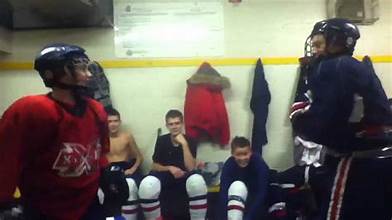The Yin and Yang of Golf and Hockey
The definition of Yin and Yang:
It means... Opposite but interconnected
Golf is all about competing with yourself.
Dedicated golfers are intense. They want to get better ... how do I break 90? For most, chasing a lower golf score is the goal, but it can be very elusive.
 |
| Legendary St. Andrews, Scotland |
Golf mates know how difficult it is. When a foursome hits the links, the group may play with a range of scores. Two players in the group may regularly score 100, and two may regularly score 90 or lower. To add to the degree of difficulty, the course builder adds things called "traps" and "hazards". But the scoring difference and ability levels don't seem to matter to golf/buds.
When I started to play the game, my partners were all much better than me and I noticed something that I think is rare and may only apply to golf. They all complimented me on everything I did, particularly when teeing off.
"Nice swing". "You really got a hold of that one". "You are still in a good position". There were different compliments attached to almost everything I did, even though I lost 13 balls on the first 9 holes. It was very encouraging of them, but I felt a little embarrassed accepting compliments for my shortcomings. I surmised that this is somehow part of the game ... keep complimenting a player even when it's not deserved, so he won't get discouraged and give it up
Is it part of the game's appeal?
To get you to keep coming back because you know your mates understand how difficult a sport it is and douse you with false praise to help you feel better about the financial investment you made in clubs and a bag and shoes, and shirts with the little alligator on the pocket and, oh yes, those greens fees?
You might call golf a genteel sport.
What about hockey?
In a recent shinny game, there was a player who was better than everyone else. The score was tied. Near the end of the match, he raced to the center, squeezed between two defencemen, feigned like he was going to fire a wrist shot, gave a head fake that moved the goalie out of position and softly slid the puck into the empty side of the net. As infamous hockey commentator, Don Cherry would say ... that was a beauty, eh?
As he skated by our bench, the player beside me stood up and yelled ... "That was a horseshit goal, and you're a horseshit player". Incidentally, the shouter was the goal scorer's best buddy.
That's hockey.
It ain't a genteel sport.
It's understood that the horseshit comment was just high praise. We all understand that his move was a thing of beauty and something we wish we all could do.
And, for those not privy to hockey dressing-room conversations, you must know that the horseshit comment most definitely carried over into that room as the players fought for time to be included in the post-game analysis. Hockey players completely understand that trash-talking each other is just part of it and would most definitely feel left out if some of the attention didn't go their way.
In hockey, a joke at someone else's expense is the order of the day, and sarcasm is encouraged.
When in the room, a player should always avoid requesting help to buy their wife the perfect birthday gift and don't stick their necks out by sharing a stock tip or offering their expert opinion on some matter of great importance ... the room's response to this expert opinion action will be noisier and nastier if you happen to be an engineer in your past life -- "Do you know the difference between God and and engineer"? ... God dosent't think he's an engineer"!
The description of this scene wouldn't be entirely accurate if I didn't mention that many dressing room conversations also contain vulgar and obscene content, but this isn't the proper forum to expose this aspect of hockey chirping.
Revealing too much personal information will never have a good result. I asked a hockey teammate if he would join us for coffee following a morning game. No, he said, "I have to go home; sometimes my wife likes to go back to bed." Heads turned as if they were on a swivel.
Whether you chase a little round white ball or 6 and a half ounces of vulcanized rubber, it's interesting to note the significant difference between the two sports.
Another worth noting is nicknames and the lack of them in the ball-chasing sport. In hockey, if you don't have one, you definitely feel neglected -- even when they're not too flattering.
A puck-chasing buddy is officially named Carmen. However, he gets ... "Miranda", "Carmine", "Carmelo", "Karm" and another player, for some reason, has been calling him "Rocky" for more than two years!
With one sport, you'll get a good job... pat-on-the-back, especially when you don't deserve it, and with the other, you get ya ... that-was-good-but-don't-get-too-full-of-yourself when you do something well.
Last week, I played with a hockey player who struggles with the skills needed to play. He told me he was going golfing in the afternoon. I asked him, with a straight face, "Are you as good at golf as you are at hockey?" He howled at the question -- a sign to me that he wasn't offended, and no harm was done.
There are lots of studies and clinical evidence to support the importance of camaraderie built through sport. Many studies highlight the importance of the banter and nonsense that goes on in sports dressing rooms, and some say that interaction between buddies is as important as playing the sport itself.
Note to self ... pay attention to the "Yin and Yang":
When playing golf, don't tell a golf mate that his golf slacks or shirt is too loud or he has a Dollar Store putter, and when playing hockey, don't tell your centerman he's a gifted stick-handler ... "opposite but interconnected."
Comment below if you wish. It was written by a hockey player, so sarcasm is encouraged.
to access the blog ... allworldhockey.blogspot.com



Interesting analysis Mike. I play both sports and you are spot on. Thanks for sharing.
ReplyDeleteMike, This was a 'horseshit' post.
ReplyDeleteGreat praise coming from you! Much appreciated.
DeleteOn behalf of all of my hockey playing comrades that also plays golf……it takes a lot of balls to golf like us…..🤷🏻♂️
ReplyDeleteGood one! I'd always make sure to sit beside you in a hockey dressing room ... I wouldn't want to miss any of your "gems"
DeleteVery well articulated, being in many hockey dressing rooms, the art of well timed sarcasm can bring down the house, and it lives on for years. Hockey camaraderie is like no other, and I feel the same about you, keep it coming pal.
ReplyDeleteOne of the best things about old-timer hockey is the connection ... I've missed seeing and playing with you at the fabulous Igloo.
Delete